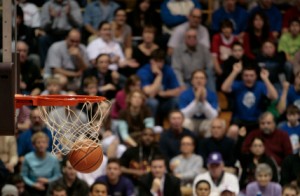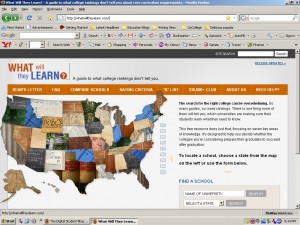College Admissions
College Admissions
Preparing for College
The Best College for You
What to Study
Applications
Education Options
Education Options
Private Universities
Public & State Universities
Community Colleges
Scholarships
Scholarships
African American Scholarships
Latino Scholarships
Native American Scholarships
Women Scholarships
College Grants
College Grants
Federal Grants
Merit Based Grants
Need Based Grants
Student Loans
Student Loans
Federal Student Loans
State Student Loans
No Co-signer Student Loans
Bad Credit Loans
Student Loan Consolidation
College Survival
College Survival
Financial Aid Tips
The Digital Student Blog
My first semester of college was an enormous wake-up call. For starters, the academic expectations were easily a shelf above those I had seen in high school.
But the greatest difference involved what I now call the level of hand-holding. As opposed to those wonderful and understanding high school teachers, my professors made only casual reminders of long-term assignments and they never postponed an exam simply because some students did not understand the material.
Simply stated, I made some mistakes my first semester that cost me dearly – by the time Christmas rolled around there wasn’t a single A to be found on my grade report and in at least two cases, classes that should have resulted in B’s had turned to C’s.
 Fortunately, I had greater expectations for myself. I also was a relatively fast-learner – I say relatively fast because it did take me one full semester to figure things out.
Fortunately, I had greater expectations for myself. I also was a relatively fast-learner – I say relatively fast because it did take me one full semester to figure things out.
Established students will likely find my missteps obvious but perhaps those of you starting your first semester can learn from my “Seven First-Semester Mistakes.”
Mistake 1. Failing to Realize You Are on Your Own
This one of course is one of those obvious ones for established students but it permeated my first semester of school.
The best thing about going to college is you finally are on your own. There will be no one nagging you about getting to bed at a certain hour or about spending too much time at the gym. No one, not even your resident assistant, will be hovering over you, asking you about whether or not your homework is done or when your next test is coming.
At the same time, the academic expectations begin with the very first class. Add to that fact that semesters are short on class time (much less frequent than in high school) and you soon learn that you have much greater work expectations between class sessions than you ever did in high school.
Still, the academics pale next to the expectation that you are, and will be, a responsible young adult. Ultimately, the nagging is replaced with a basic assumption that you are old enough to handle responsibilities without being reminded of them daily.
Mistake 2. Being Unorganized
Another major mistake I made was the failure to create a master schedule of my courses and the assignments for the semester. Though I did create a notebook with separate sections with each syllabus, I never synthesized the materials on one master calendar.
 The bottom line was that many times I got caught not looking far enough ahead. On more than one occasion I found myself running out of time as materials became due or test dates arrived.
The bottom line was that many times I got caught not looking far enough ahead. On more than one occasion I found myself running out of time as materials became due or test dates arrived.
That first semester I learned the importance of taking the entire syllabus for each course and plotting all daily assignments, major projects/papers and exams on one master calendar. Doing so in future semesters helped me to understand that while this Tuesday I might have had little to do, next Tuesday the expectations might be so great I would need to be up half the night to complete all that was expected.
Every Sunday night I would review the upcoming week in detail, then scan the expectations for the following two weeks to see what I should begin working on ahead of time. Of course, creating such a calendar is a time-consuming first task – but it was a life-saver in future semesters.
Mistake 3. Being Unorganized – Redux
The second organizational aspect related to retaining all materials for the semester in their appropriate notebook. Those materials included all the original handouts, the additional ones provided during the semester and all returned assignments, quizzes and tests.
On many occasions I spent five, ten or even fifteen minutes searching for a certain document that was on my desk somewhere. On other occasions, I actually lost some graded materials, papers I could have definitely used in preparation for final exams.
I learned that first semester that I would receive and produce more materials than I ever did in high school and that taking care of those materials when I received them saved countless hours of time over the course of a semester.
Mistake 4. Multiple Course Sections Are Available
Another element I learned the hard way was that at college you had choices as to which courses and sections you opted to take. You can pick classes according to your learning style as well as quality of teaching.
For example, lecture-based classes were not my forte and taking them on Tuesday and Thursday meant longer class periods and an even greater test of my attention span. Such classes were far more manageable for me following a Monday-Wednesday-Friday format.
Perhaps even more importantly, the multiple sections of courses means you do not have to put up with a low quality instructor. That first semester I mistakenly sucked it up and stuck out two such classes, both to my detriment.
College is difficult enough without having to try to deal with poor quality instruction or a disorganized professor. In such cases, even first semester freshman can seek another section of the course immediately.
Mistake 5. Thinking Your Dorm Room Is a Great Place to Study
The need for a quiet place to do some real studying is essential. Yes, most times you can work in your dorm room or the lounge, but no matter how good your roommates or dorm-mates are, even at the quietest moments there will be distractions.
 To get some real focused time you must find a place where you can truly disappear. I have heard some say you must find a cave somewhere on campus.
To get some real focused time you must find a place where you can truly disappear. I have heard some say you must find a cave somewhere on campus.
They exist – I found mine in the back stacks of the library. And you must use your place whenever you need to find some real quiet time.
Most importantly, you and only you, the young adult, can determine when such a time is needed.
Mistake 6. Asking for or Accepting Extensions
Because of my somewhat lackluster organizational skills, I remember struggling to complete one major paper for my Economics class. As I stated earlier, I simply had not plotted out an overview of the semester and all of sudden I seemed to be struggling to find the time to meet a group of expectations as final exams approached.
Naively, as the deadline for that major assignment drew near, I overheard a classmate discussing a possible extension with the professor. The professor offered some simple extension terms, one-third of a letter grade per class period (one period late, a B+ would drop to a B, two periods late that B+ would drop to a B-, etc.).
I convinced myself that the extension terms were reasonable and would help me. Given I had decent writing skills, I foolishly decided to take one additional week (three class sessions) to turn the paper in.
At the time I assumed my final product would earn an A or A- meaning at worst I would take home a B- or C+ for the paper, a good enough score to maintain the B average I had worked all semester for.
Evidently I wasn’t quite the writer I thought I was – remember the point about increased expectations earlier? The professor scored my original paper a B-, with the docking it became a C-, and because of the grading weight of the paper, my B average for the semester fell to a C+.
I learned the hard way to get my work done when it was due.
Mistake 7. Not Limiting the Social Scene
At college, social events occur virtually every night of the week. From athletic events to open-mic nights to movies there is always something available to do that seems more enticing than your studies.
Add to that the Thursday night party group, the students taking a less demanding academic program (and content with earning Cs in those courses) and you always have someone trying to get you to take a few hours off for some social activity.
Taking time from studies is critical to maintain an emotional balance. But if you are not careful, it is all too easy to get pulled away by your roommate or other dorm-mates at times when you really should be getting some much needed work done.
Remember there is always something social to do and someone you know will be doing it – that simply means you can skip specific social opportunities when work demands prevail as there will always be another fun thing to do tomorrow.
Generally speaking, I love attending college sporting events. The atmosphere can be electric and the games certainly provide an opportunity for students to get a little rowdy with friends.
In sum total they can serve as a much needed-alternative to the stress of papers and tests.
But unfortunately, the college athletic model has succumbed to the same pressure that drives the professional sports world: money. The quest for the almighty dollar can lead to shameful behaviors, greed being what it is, and to situations like the recent one involving the Memphis men’s basketball program.
 At the same time, the Memphis situation reveals the perverse world of college athletics, one where the two people most responsible for a problem, the student-athlete and the coach, somehow manage to earn greater sums after the incident, while the people least responsible, the player’s teammates, become victims of the greedy system.
At the same time, the Memphis situation reveals the perverse world of college athletics, one where the two people most responsible for a problem, the student-athlete and the coach, somehow manage to earn greater sums after the incident, while the people least responsible, the player’s teammates, become victims of the greedy system.
Using an Improper Player
Under the current model, college coaches recruit gifted players, many who would not academically qualify for admission if not for their athletic talents. Even the best schools today adjust their admission standards so as to be able to compete in the financially lucrative world of college athletics.
The recent Memphis situation involved the immensely talented Derek Rose (in what amounts to the biggest sham going, Rose is not actually named as the culprit), a young man who had failed to reach the minimal ACT score for college eligibility during his first three efforts. Given that a college scholarship was on the line and a new professional basketball policy that prevented teams from drafting players directly out of high school, Mr. Rose apparently engaged a surrogate student to take and pass the SAT test.
As but one sign that the coach recruiting Derek Rose might think something was amiss, Rose lived in Chicago. But the passing SAT score was obtained in Detroit, some 283 miles from Rose’s home city.
That did not deter John Calipari from signing the marginal student. Thus, for the second time in Coach John Calipari’s career he took a team to college basketball’s biggest stage, the Final Four, using an ineligible player.
In both cases, the issues were revealed after the fact, and as a result the governing body of college athletics, the NCAA, expunged the team performances from the record books. In the case of Memphis, the team’s 38 wins were forfeited and the Tigers name removed from being a final four participant.
Rich Get Richer
While the school and the other players who were part of the team have seen their performance vacated, Rose and Calipari have simply shrugged their shoulders and moved on to mounds of cash. Rose of course became a first round pick of the NBA after his one tainted season at Memphis. The rookie earned a little more than $5 million in his first season with the Chicago Bulls.
Meanwhile Calipari has managed to secure a brand new position in Lexington where he will coach another legendary basketball program, the Kentucky Wildcats. His salary comes in just under that of Rose, in the four-million dollar a year range.
A few outside Kentucky have asked a rather simple question: was Calipari in a position to know better? One would think the answer was yes, that a prudent person would have had significant doubts about how Rose managed to pass his exam.
But the money involved in high-profile college athletics tends to make some coaches hesitate. In this case, Calipari did more than hesitate, he ignored the obvious.
 In essence, it would also seem the NCAA felt likewise. Why else would it eventually rule that Memphis had to vacate its entire season including their Final Four Appearance?
In essence, it would also seem the NCAA felt likewise. Why else would it eventually rule that Memphis had to vacate its entire season including their Final Four Appearance?
But in yet another head-scratcher, a sign of all that is wrong, the folks who hired Calipari at Kentucky continue to stand by their choice despite the developments at Memphis. They insist that Calipari was not responsible for the issues related to Rose.
Indirectly, they also are conveniently ignoring that Calipari is now the only college coach in history to have two Final Four teams stripped of their accomplishments by the NCAA.
A Model Governed by Money
As with all legal cases that have huge financial ramifications, the ruling is being appealed by Memphis. Pending that appeal, Calipari has indicated he will not discuss the issue.
But he will start coaching at Kentucky irrespective of that appeal. That certainly has the folks at Kentucky hoping that what “happened in Memphis will stay in Memphis.” But as one more sign as to the flaws in the current model, consider the incentives, above and beyond the $4 million base salary, that Kentucky has placed in the Calipari contract:
College sports and money – how the model must change.
Students searching for the right college have a variety of sources available that help provide advice during the selection process. In recent years, a good many individuals have come to rely upon the U.S. News and World Report for its well-known college ratings guide.
However, incidents involving questionable reporting by the University of Southern California and the suggestion by folks at Clemson that the U.S. News data can be manipulated have raised concerns with the accuracy of the information provided by this publication.
So it is not too surprising to see the launch of a new site, WhatWillTheyLearn.com, which seeks to provide some additional information about the college landscape.
Interesting Focus
Touted as a guide to provide insight that other rankings and college guides fail to address, WhatWillTheyLearn attempts to determine the schools that “are making sure their students learn what they need to know.” Suggesting that most colleges and universities are using a do-it-yourself curriculum approach, a process leading to graduates “with a thin and patchy education,” the free website is designed to help parents and students determine which “colleges are preparing their graduates to succeed.”
To determine which universities are making sure their students learn what they need to know, institutions are rated on seven key areas of knowledge.
Former Harvard Dean Harry Lewis represents the public face of the site. He notes that the requirements that colleges impose, though specifically designed to make sure students receive a well-rounded education, are actually very misleading.
 Lewis notes: these requirements “often simply call for one course in the humanities, one course in social science, and so on.” Unfortunately, according to Lewis, “On some campuses, it doesn’t matter at all what courses are chosen, as long as they are in the right categories. Other schools limit the courses so that they meet some special criteria, but there is little sense of how each individual course relates to the others.”
Lewis notes: these requirements “often simply call for one course in the humanities, one course in social science, and so on.” Unfortunately, according to Lewis, “On some campuses, it doesn’t matter at all what courses are chosen, as long as they are in the right categories. Other schools limit the courses so that they meet some special criteria, but there is little sense of how each individual course relates to the others.”
Lewis is not pleased with this development and goes on to add, “This is deplorable … at its best, general education is about the unity of knowledge, not about distributed knowledge. Not about spreading courses around, but about making connections between different ideas. Not about the freedom to combine random ingredients, but about joining an ancient lineage of the learned and wise. And it has a goal, too: producing an enlightened, self-reliant citizenry, pluralistic and diverse but united by democratic values.”
As for one very specific example of the hodge podge nature of college curricula on college campuses, Lewis touts the studies that reveal many “college graduates are ignorant of the basic principles on which our government runs.” According to Lewis, it is easy to understand why “most cannot identify the purpose of the First Amendment, what Reconstruction was, or the historical context of the Voting Rights Act.
“The vast majority of our colleges have made a course on the broad themes of U.S. history or government optional. This is especially dangerous in America, where nothing holds us together except our democratic principles.”
Grading System Used
WhatWillTheyLearn focuses on a couple of pieces of information often provided in other catalogs including how much schools will be charging and how many of their students earn a degree. But the site also provides information on what a college will expect graduates to study outside their majors.
Essentially, to determine the state of a respective school’s general education program, WhatWillTheyLearn examines whether or not a school requires seven key subjects: English composition, literature, foreign language, U.S. government or history, economics, mathematics, and science. These are subjects, according to the website, that have become “mere options on far too many campuses.”
 To provide a rating for a school, WhatWillTheyLearn looks at very specific course elements. For example, in Composition, the expectation is an introductory college writing class focusing on grammar, style, clarity, and argument. For Literature, the expectation is a course featuring a broad comprehensive literature survey and cannot be simply “narrow, single-author, or esoteric courses.” In the area of Foreign Language, there is a demand for demonstrated “competency at the intermediate level, defined as at least three semesters of college-level study in any foreign language.”
To provide a rating for a school, WhatWillTheyLearn looks at very specific course elements. For example, in Composition, the expectation is an introductory college writing class focusing on grammar, style, clarity, and argument. For Literature, the expectation is a course featuring a broad comprehensive literature survey and cannot be simply “narrow, single-author, or esoteric courses.” In the area of Foreign Language, there is a demand for demonstrated “competency at the intermediate level, defined as at least three semesters of college-level study in any foreign language.”
For U.S. Government or History, the expectation is a “survey course in either U.S. government or history, with enough chronological and topical breadth to expose students to the sweep of American history and institutions” while “narrow, niche courses do not count for the requirement, nor do courses that only focus on a narrow chronological period or a specific state or region.” In the field of Economics, the requirement is an introductory course covering basic economic principles in micro- or macroeconomics and to be valid it must be taught by faculty from the economics or business departments.
In Mathematics, the requirement is for a college-level course (advanced algebra, trigonometry, calculus, computer programming, statistics/probability, or mathematical reasoning at or above the intermediate level). And in the Natural or Physical Science field, the expectation is a college-level course in “astronomy, biology, chemistry, geology, physics, or environmental science, preferably with a laboratory component” (and must be taught by faculty from within the school’s science department).
Using these criteria, a school is assigned a grade based on how many of these seven subjects students are required to complete while earning their diploma (A: 6-7 core subjects required, B: 4-5 core subjects required, C: 3 core subjects required, D: 2 core subjects required, and F: 0-1 core subjects required).
Liberal Arts Proponent
Some may see the site as having a specific bias as it is sponsored by the American Council of Trustees and Alumni (ACTA), an independent, non-profit organization that was launched in 1995. According to their website, ACTA is “committed to academic freedom, excellence, and accountability at America’s colleges and universities” and to ensuring “that the next generation receives a philosophically rich, high-quality college education at an affordable price.”
That said, it must be noted that ACTA is a huge supporter of the liberal arts education model. Yet it is interesting to see a proposed model that does not demand a full liberal arts approach, just a more focused curriculum in the general education courses.
Since one can never have too much information, we suggest students check to see how the schools they are considering stack up on this new site. Again, this is not your U.S. News and World Report version (it was astonishing to see Bowdoin College receive an F). Just be forewarned, the site is still in the early stages with only 125 or so schools rated.
We see where a New York woman has taken the extraordinary step of suing the college where she earned her bachelor’s degree. Trina Thompson, 27, recently filed a lawsuit against Monroe College seeking to recover the $70,000 she spent on tuition.
Thompson was awarded a degree last April in information technology. She is suing the school based on her failure to attain employment in her field of study, insisting that the college’s Office of Career Advancement did not provide her with the leads and career advice the school had promised.
 According to her mother, Thompson is “very angry at her current situation.” Indeed, being without work and with student loans now coming due, Thompson finds herself in a real predicament.
According to her mother, Thompson is “very angry at her current situation.” Indeed, being without work and with student loans now coming due, Thompson finds herself in a real predicament.
Expected Response
Not too surprisingly, Monroe College took strong exception to being sued on such grounds. College spokesman Gary Axelbank used very strong language in responding to the claim, stating that suit was “completely without merit” and did not deserve further consideration.
We suspect that the response of many other school spokespeople would be similar if their school were to be served with such a legal claim. We also have to say that Axelbank is essentially right on legal grounds.
Certainly a college cannot be held liable simply because one of its graduates cannot find employment. Even if the student successfully completed her academic program and was awarded a diploma, a degree is not a job guarantee, certainly not in this job market.
But while Monroe’s response might be expected, it is interesting to note that there are colleges who take this matter to heart. In fact, one small college in Maine, Thomas College, has what it calls its “Thomas Promise.”
Yes, this school stands behind the education it provides and insists that it will help graduates find a job in their profession. And the school backs it up with real dollars.
The Promise
Thomas College is in Waterville, Maine, sharing the town with one of the nation’s top small liberal arts schools, Colby College. For ten years now Thomas has made a special promise to its graduates: a guaranteed job after graduation.
And we are not talking about summer fill in, part-time work. We mean a real job in the student’s chosen field of study.
 If a student is unable to find a job by graduation, he or she continues to meet with a college career advisor to find a permanent job. If the student does not find such a job within six months of graduation, then Thomas College will pay the first year of the student’s subsidized federal loans or until they find employment, whichever comes first.
If a student is unable to find a job by graduation, he or she continues to meet with a college career advisor to find a permanent job. If the student does not find such a job within six months of graduation, then Thomas College will pay the first year of the student’s subsidized federal loans or until they find employment, whichever comes first.
Perhaps even more amazingly, if a graduate finds employment but does not like their chosen profession, he or she may return to Thomas to study tuition-free. The offer includes the costs of up to two additional undergraduate years to take more courses or half of the graduate courses required to complete a Master’s degree program.
The school does set forth two criteria that students must meet to be eligible. You do have to earn at least a 2.75 grade point average and you must, during your undergraduate years at school, do an internship.
Both requirements make sense. You cannot simply skate by, you need to show decent academic progress. And doing an internship just might be one of the most valuable aspects of any college program as it gives students first hand experience working in their chosen field.
Colleges Should Deliver the Goods
The promise represents an amazing commitment but clearly the school works hard on behalf of graduates. Thomas has a placement rate of better than 90% for the ten years of the program. In 2008, in a normal job market year, the school’s placement rate was 96 percent.
Of course, Maine is a bit unusual as only one in three Mainers has a college degree. So, graduates certainly have enormous advantages when it comes to applying for work.
Though the school is the only one we know of making such promise, the steps taken by Thomas are definitely more in line with what one would expect if colleges were to operate within the business sector. Standing behind a product is something we have come to expect especially if that product represents a significant purchase dollar-wise.
Monroe might be okay with its response in a legal sense. And it may be a bit unfair to pass any judgment on the suit; certainly it must be a collaborative effort between the student and the school when it comes to the job search process and we cannot fairly comment on the efforts made by the plaintiff.
But given the cost of a college education, the overall matter deserves serious thought. In fact, we think that it is time that every school stands behind the product it delivers.